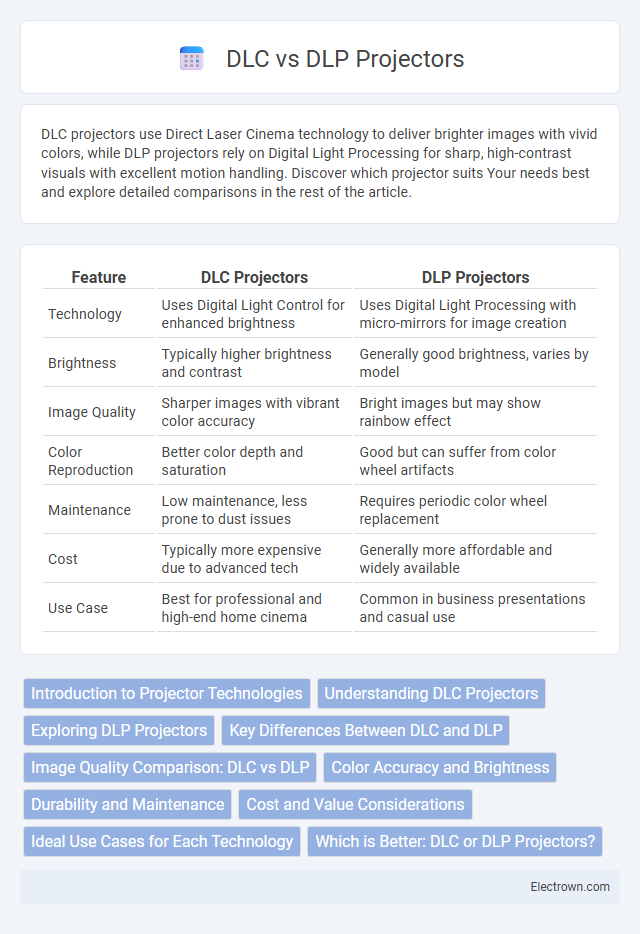DLC projectors use Direct Laser Cinema technology to deliver brighter images with vivid colors, while DLP projectors rely on Digital Light Processing for sharp, high-contrast visuals with excellent motion handling. Discover which projector suits Your needs best and explore detailed comparisons in the rest of the article.
Table of Comparison
| Feature | DLC Projectors | DLP Projectors |
|---|---|---|
| Technology | Uses Digital Light Control for enhanced brightness | Uses Digital Light Processing with micro-mirrors for image creation |
| Brightness | Typically higher brightness and contrast | Generally good brightness, varies by model |
| Image Quality | Sharper images with vibrant color accuracy | Bright images but may show rainbow effect |
| Color Reproduction | Better color depth and saturation | Good but can suffer from color wheel artifacts |
| Maintenance | Low maintenance, less prone to dust issues | Requires periodic color wheel replacement |
| Cost | Typically more expensive due to advanced tech | Generally more affordable and widely available |
| Use Case | Best for professional and high-end home cinema | Common in business presentations and casual use |
Introduction to Projector Technologies
DLC (Digital Light Processing) projectors use a microscopic mirror array to reflect light and create sharp, vibrant images, making them ideal for home theaters and business presentations. DLP (Digital Light Processing) projectors, often used interchangeably with DLC, rely on a spinning color wheel combined with DMD chips to produce high contrast and vivid colors. Understanding these projector technologies helps you choose the best option for your display needs based on image quality, brightness, and portability.
Understanding DLC Projectors
DLC (Digital Light Processing) projectors utilize a micro-mirror chip to direct light and create sharp, vibrant images with high contrast ratios and accurate color reproduction. Unlike DLP (Digital Light Processing) technology that often involves a single-chip system, DLC projectors can enhance image quality by incorporating advanced light control mechanisms, improving brightness and reducing rainbow effects. Understanding DLC projectors highlights their ability to deliver superior performance in both home theater and professional environments through innovative light modulation techniques.
Exploring DLP Projectors
DLP projectors utilize a digital micromirror device (DMD) chip to create sharp, vibrant images by reflecting light through thousands of tiny mirrors. This technology offers higher contrast ratios and better motion handling compared to LCD projectors, resulting in smoother video playback, especially in fast-moving scenes. DLP projectors are often preferred for home theater setups and presentations due to their compact design, reliability, and ability to produce deep blacks and vivid colors.
Key Differences Between DLC and DLP
DLC projectors utilize Laser Chip technology offering brighter images and a wider color spectrum, while DLP projectors rely on Digital Light Processing with micro-mirrors for high contrast and sharpness. DLC projectors typically provide longer lifespan and lower maintenance compared to DLP models, which may experience the "rainbow effect" but excel in fast image processing. Your choice between DLC and DLP should consider factors like image quality, durability, and color accuracy tailored to your projection needs.
Image Quality Comparison: DLC vs DLP
DLC projectors offer superior color accuracy and deeper contrast ratios compared to DLP projectors, resulting in more vibrant and lifelike images. DLP projectors, while providing sharper image clarity and faster refresh rates, may suffer from rainbow effects and less precise color reproduction. Your choice depends on whether you prioritize rich color performance with DLC or high image sharpness and speed with DLP technology.
Color Accuracy and Brightness
DLP projectors typically offer higher brightness levels due to their efficient light processing, making them ideal for well-lit environments, while DLC projectors excel in color accuracy with their advanced liquid crystal technology that enhances color saturation and contrast. DLC projectors deliver richer and more precise color reproduction, especially in darker scenes, by using dynamic light control to reduce color bleed and improve grayscale performance. For applications requiring vivid colors and sharp brightness, DLP projectors are preferred, whereas DLC projectors are favored for color-critical tasks such as graphic design and cinematic viewing.
Durability and Maintenance
DLC projectors feature durable components designed for longer operational life and reduced maintenance frequency, utilizing advanced sealing technology to prevent dust and moisture intrusion. DLP projectors benefit from a robust chip design with fewer moving parts, resulting in lower maintenance needs and increased reliability over time. Both technologies prioritize longevity, but DLC projectors often deliver enhanced resistance to environmental factors, contributing to superior durability in demanding settings.
Cost and Value Considerations
DLC projectors generally have a higher upfront cost due to their advanced digital light processing technology, offering sharper images and better color accuracy, which enhances their value for high-end home theaters or professional use. DLP projectors often come at a lower price point, making them more accessible for budget-conscious consumers or casual use, though they may sacrifice some image quality and color precision. Evaluating cost against performance needs helps determine the best investment, with DLC models delivering superior long-term value in image quality and durability, while DLP options provide effective value for everyday entertainment.
Ideal Use Cases for Each Technology
DLC projectors excel in large venues and environments requiring high brightness and vivid color accuracy, making them ideal for cinemas and immersive home theaters. DLP projectors offer compact designs and smooth motion handling, perfect for business presentations, classrooms, and portable entertainment setups. Choosing the right option depends on your need for image quality versus portability and maintenance preferences.
Which is Better: DLC or DLP Projectors?
DLP projectors use a digital micromirror device to create sharp, high-contrast images, making them ideal for fast-motion video and gaming. DLC projectors, incorporating Laser and DLP technologies, typically offer brighter output and longer lifespan due to their laser light source. Choosing between DLC and DLP depends on usage needs: DLC projectors excel in brightness and durability, while traditional DLP projectors are often more cost-effective with excellent image quality.
DLC vs DLP Projectors Infographic

 electrown.com
electrown.com